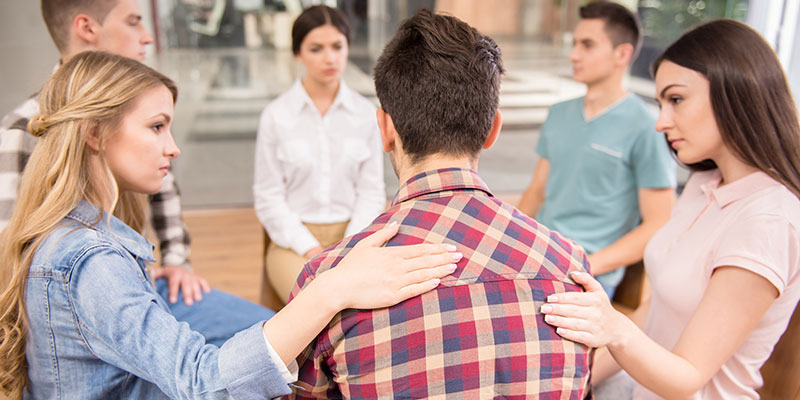Location
Our Seattle Location
Northpoint Seattle’s outpatient treatment program is located in beautiful Seattle, Washington, and we work to help the surrounding communities.
- Seattle
2111 N Northgate Way Suite 101,
Seattle, WA 98133, United States
Heroin recovery is necessary for anyone who struggles with this addiction. However, if you've never been to any type of drug rehab before, you may have a lot of questions. You need to know what you can expect to happen, and what your recovery will be like.
It's important for you to get your questions answered. That is why we've created this guide for your heroin recovery. If you are addicted to this dangerous drug, you probably feel hopeless. You may have thought there was no way out for you. The fact is that there is a way out, as long as you have the right kind of help.
Right now, you're thinking about recovery, but you might not be convinced it's necessary. You may be thinking that you should just quit using drugs on your own, and move on with your life. Many people feel the same way, so you're certainly not alone.
There are a lot of reasons why you should consider professional heroin treatment. Rehab should never be viewed as an unnecessary step in your recovery. It is actually the step that will give you the best chance of being successful.
Some reasons you should consider professional rehab include:

You should know that recovering from this type of addiction is not going to be easy. This is because of the way that this drug changes the chemistry of your brain. The long-term effects of heroin use are not easy to overcome, but they can be overcome.
Research shows that the effects of this drug on your brain are not easily reversed. You may have some deterioration of the white matter in your brain. You may have a hard time regulating your behaviors, and you will have cravings. Some people even experience heroin cravings for years after they've successfully quit.
Nonetheless, you should also know that it will be worth it. You'll be rewarded every morning when you wake up after having another day of being clean under your belt. The beginning of your recovery may be hard, and there will be days you want to give up. However, if you persevere, you'll begin to experience the many benefits that go along with freedom.
Quite often, people wonder if they need to go to treatment if they are only abusing this substance. These are individuals who may use this drug occasionally, but it's not a regular occurrence. This could also be a situation you're facing too.
If you are abusing heroin, but you're not addicted to it, you don't necessarily need rehab. However, you do need to know the difference between being an abuser and being an addict.
Abusing this substance refers to any use of it in any capacity. This is because the drug is illegal. However, when you abuse it, you don't feel compelled to use it like you do if you have an addiction. You may enjoy the high it gives you, and you may like to use it, but you don't have to.
According to the CDC, heroin abuse has increased dramatically in recent years. They state that heroin use has more than doubled in adults between 18-25 years old in the last decade.
The problem is that people who abuse this dangerous drug tend to think they're not at risk for addiction. They assume that they can use it for as long as they want to without becoming addicted. This simply is not true. Heroin abuse may not be the same as addiction, but it can quickly become an addiction.
You admit to using heroin, but you may be unsure about whether or not you're addicted. Many people fall into this same category. If you're not sure, but you suspect you may be an addict, you need some clarification. There are different ways you can go about getting it.
Taking a quiz can help you identify if you're an addict. This quiz will ask you several questions about your drug use. It's important to be honest when you answer them. You'll get your results right away.
Are you familiar with what the signs of drug addiction are? Looking for the following signs in your own life can help you understand if you need professional treatment or not:
Sometimes it's just easier to talk with a professional about your heroin abuse. Many drug rehab centers offer free phone assessments to potential patients. This might be something you should consider for yourself.
It can be so helpful to explain the details of your drug use to someone in person. That way, you can also avoid second-guessing yourself.
For heroin addicts, drug detox is the first step in the recovery process. If you're like many people, you may be tempted to skip this step. It's very important that you don't.
Detoxification is going to help your body get rid of those toxins. It specifically targets the physical part of your addiction. This component is very difficult to manage without detox.
Your addiction is unique, and it's important to get the type of detoxification that best suits you.
Once you became addicted to heroin, your body got used to having it regularly. In a way, it became a part of you. When you stop using it, your body will react in a negative way; at least at first. Detoxification can help with that process, and make you much more comfortable as you recover.
There are a few different ways that you can go through the detoxification process. It's important to understand what the various approaches to detoxing from heroin are.
Medical detox is probably the most popular method of detoxifying the body due to a drug addiction. It relies on the use of medications to control withdrawal symptoms and eliminate toxins.
There are a number of different medications that could be used during medical detox. Some commonly used medications include:
Other medications have been specifically formulated to help with heroin withdrawal symptoms. Drugs like Suboxone and Subutex are very common for opioid detox.
Holistic detox is quite different from medical detox. Both methods involve constant supervision and guidance. However, holistic detox differs in that it does not involve the use of any medications. Instead, it relies on natural ways to rid the body of toxins.
Many experts agree that holistic detoxification might be the best approach for detox. The argument can be made that it's dangerous to introduce potentially addictive drugs to an addict. The risk for secondary addiction is just too great.
For those going through holistic detox, the focus is on improving overall health. Implementing a proper diet and regular exercise are both big parts of this. The body is very capable of detoxing itself under the right circumstances. Holistic detoxification allows this to take place.
If you have ever gone without using for a period of time, you likely understand withdrawal. Heroin withdrawals are not easy to go through. For many people, they can even be painful, both physically and emotionally.
When you do stop using, heroin withdrawal is something you should expect. Though you might be surprised at the severity of your symptoms.
Typically, people experience several different types of withdrawal symptoms when stopping this drug. Everyone's experience is different, so you might not have all the symptoms on this list.
Heroin is an opioid drug, and opioid withdrawal can involve:
Now that you know what you can expect, you also want to know how long it will last. The good news is that because this is a fast-acting opioid, it also leaves the body quickly. That means your withdrawal isn't likely to last as long as it might with other drugs.
You should begin to see withdrawal symptoms appear within 6 to 12 hours of your last dose. At first, heroin withdrawal will be mild, and it might not bother you that much.
As the hours go by, your symptoms will become more severe. You may see new symptoms develop that you didn't have in the beginning. Withdrawal should peak by about the third day, and then begin to improve.
You should expect the withdrawal period to last for about 5 to 10 days. However, in some cases, it has been known to last a bit longer than this. You could also experience recurring cravings for several months, or even years.
What many people don't realize is that there are often additional disorders that accompany addiction. When this happens, these are called co-occurring disorders.

Co-occurring disorders are mental health conditions that many addicts suffer from. This is also referred to as having a dual diagnosis. There are many different types of co-occurring disorders. Some examples include:
Quite often, these mental health conditions go undiagnosed or ignored. Too many addiction treatment professionals will overlook them. They assume that a patient's behavior is because of the addiction.
The fact is that co-occurring disorders and addictions often go hand in hand. In fact, according to SAMHSA, close to 8 million people suffered from co-occurring disorders in 2014. This is a large percentage of those who have been diagnosed with addictions.
If you are a heroin addict, you may also have a co-occurring disorder, even if you think you don't. It's possible that the co-occurring disorder has led to your addiction to this dangerous substance.
Unless the co-occurring disorder is treated, the addiction cannot be successfully treated either. Think of the dual diagnosis as being the underlying problem behind the addiction. It must be dealt with appropriately. If the root cause is not uncovered and healed, the active addiction is likely to return.
We know that we have covered a large amount of information so far. Maybe you can see the value in professional heroin recovery, but you'd still like to try quitting alone. Many people feel the same way that you do. You could even be telling yourself that you'll attempt it on your own first, and then get help if you fail.
There have been people who have tried to stop using this drug alone, but not many have been successful. It is a very hard addiction to break. However, if you attempt it, there are a few steps the experts say you should take.
The first step in quitting this drug cold turkey is to make a promise to yourself that you're going to quit. Once you stop, tell yourself that there will be no turning back. Going back to heroin could be deadly for you because the risk of overdose is so high.
Once you're ready to try quitting on your own, you should follow these steps:
A relapse occurs when someone who has stopped using drugs goes back to using them again. They are very common among those who suffer with addictions. In fact, an addiction is known as a relapsing disease among people who work in this field.
Relapses are not only common, but they are also dangerous. If you relapse back to heroin use, you're likely to encounter one of two scenarios. The first possibility is that you will reinforce your addiction. Relapsing is a part of the cycle of addiction. You're telling yourself that you need drugs in order to be OK. Without them, you're not OK, and actually, you're not able to make through the day.
The second possibility is the risk of an overdose. More often than not, overdoses occur because someone has relapsed on heroin. In fact, some experts believe that this drug causes more drug overdoses than any other drug.
An overdose takes place when someone uses too much of any drug. It is possible to overdose on heroin without trying to quit using it first. Sometimes people will obtain a substance that's too pure, and they're not aware of this. In these cases, they can overdose.
However, overdosing on this substance is more typical after a period of abstinence from it. Drug users often don't realize that their tolerance levels change quickly. This means that when they quit using, it takes less of the drug to get them high than it did before. Because they don't know this, when they relapse, they return to using the same amount. Their bodies can no longer handle that much heroin, and an overdose is the result.
It's important to be able to identify the signs of a possible heroin overdose. You may need to act quickly if you're with someone and they use too much of this drug.
The signs to look for include:
Even if you only notice one of the signs on this list, getting emergency medical help is critical. It could save someone's life, and it's better to be safe than sorry.
If you relapse, an overdose is very likely. In fact, the number of heroin overdoses in the United States has been increasing for decades.
This type of overdose can be deadly unless immediate help is obtained. You need to get to a hospital right away, where they can give you medication to reverse it.
Quite often, people are nervous about the way addictions are treated at drug rehab programs. You may be feeling the same way. In fact, it might make you hesitate on even making that first inquiring phone call. There's no need for you to be nervous.

The bottom line is that having a heroin addiction is dangerous. This is not a drug that most people can use once or twice and leave alone. It's a drug that people will return to time and time again. They'll often try to make change to how they're using it as a way to enhance the high.
No matter how you use it, it's dangerous. Stopping its use now is the only way to keep you safe. No matter what you may think, it's never too late for you to recover.
Maybe you've made the decision to go to addiction treatment. However, you really don't know where to begin looking. You're not sure what qualifications or characteristics you should be searching for.
Recovering from a heroin addiction is a serious matter. You want to be sure you're doing it the right way. That means placing your needs in the hands of professionals who care about you.
At Northpoint Seattle, we know how difficult it is to recover from a heroin addiction. We also know the best ways to assist you. We're committed to helping you through every step of the process. The worst thing you can do is to put off getting the help you need.
We're confident that you'll find our IOP program to be exactly what you're looking for. We've been able to successfully help so many people recover from their addictions. It's a flexible program, which means it's designed to fit your unique needs as a patient.

Our admissions coordinators are here to help you get started with treatment the right way. They'll verify your health insurance, help set up travel arrangements, and make sure your transition into treatment is smooth and hassle-free.
888.483.6031Contact Us